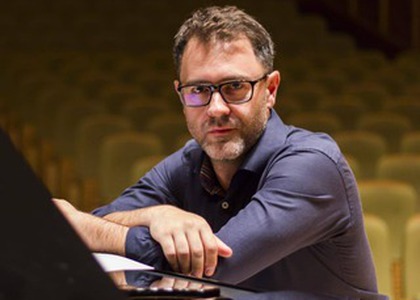> Interviews

Interview with pianist Ștefan Doniga
Pianist Ștefan Doniga spoke about the project "The Road to Freedom," the world tour he held with violinist Diana Jipa, between September 7th and October 1st, 2024. The tour commemorated 35 years since the Romanian Revolution.
Mr. Ștefan Doniga, you held the world tour "The Road to Freedom" together with violinist Diana Jipa, a project that commemorated 35 years since the Romanian Revolution. How would you describe this experience? What were the most beautiful moments during these few weeks?
The most beautiful moments of these weeks were, in fact, the entire period. I wouldn't be able to single out one moment, one day, or one recital. It was an absolutely extraordinary experience, a true cultural expedition, as we liked to call it. Indeed, together with Diana Jipa, we created something unique, artistically speaking, for Romanian culture-the fact that we reached all six continents in a single tour, meeting so many cultures, so many Romanian communities, with audiences that had different expectations and moods. But all of these were united under the beautiful umbrella of Romanian music, which we brought across all continents, to the entire world. An extraordinary experience, indeed. An experience that we would repeat any time, even though it is tiring, full of small and beautiful adventures, with which perhaps a beautiful tour diary could be written once we have time. But what matters most is that it brought joy to us, and more importantly, we felt it brought true joy to the audience.
So, do you believe the tour achieved its goal? How was the initiative and Romanian music received by the audience? You mentioned the Romanian public, but how was it received by international audiences?
Romanian music is always received very well by the public. It is music with universal appeal, with an aura of universality, and that is why our projects are framed under the generic title " Universalis Romania," where we don't necessarily seek to prove something, but rather demonstrate this universality of Romanian music every time. Regardless of the cultures we reached, Romanian music is very well understood because it is truly valuable. It has characteristics that make it comprehensible and deeply felt by listeners or music lovers. Therefore, the public received these works very well every time. There were also very diverse and rich pieces, 10 works by Romanian composers from seven different ethnic backgrounds-so, a beautiful diversity, a very relevant richness for Romanian cultural space. And of course, all this warm reception we continually get from these recitals turns into a beautiful joy of being close to Romanian music, of promising-as much as we can and as much as we hope to-that we will return, because this was not our first experience. We wouldn't have attempted such a daring project from the very first time. A year ago, we were the first Romanian musicians to tour the entire world in a single tour. We already had experience with long tours and large areas to cover, and we knew we could successfully meet the expectations of such a varied audience.
After your musical journey through six continents, you continued your mission of promoting Romanian music with the recital "Three Centuries of Romanian Music," which you presented together with Diana Jipa to the audience at the Sureyya Opera in Istanbul. How would you describe your encounter with the Turkish audience?
It was an absolutely wonderful and emotional encounter! I would say it was a continuation at perhaps a slightly higher level than everything we accomplished during our tour. I say this because each of the six concerts was organized in cooperation with partners from the respective countries, but these were, I would say, private entities-Romanian associations or cultural organizations in those areas-that generously provided their logistical support. However, the recital in Istanbul was organized in partnership with the Romanian Cultural Institute "Dimitrie Cantemir," and the resources and organization for this event were entirely different. The Sureyya Opera is one of Istanbul's main concert halls, a historic venue with a massive tradition and its own audience. Just the presence of a program in such a hall guarantees the quality of the performance for the audience. The public came, in large part, likely interested in Romanian music, but also, to some extent, based on the guarantee that being on such a stage brings. As a result, the nearly 1,000-seat hall was full, and the audience's response was extraordinary.
But this won't be the last international adventure we propose to both the Romanian audience and audiences everywhere. We will go even further than we went this year, and very soon, we can't wait to reveal the details of our next musical and geographical adventure.
Translated by Ioana Nicolescu,
University of Bucharest, Faculty of Foreign Languages and Literatures, MTTLC, year I
Corrected by Silvia Petrescu














